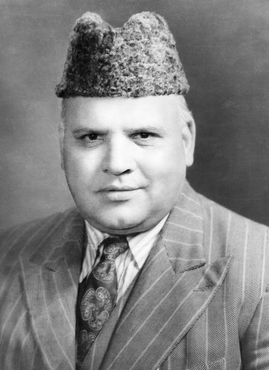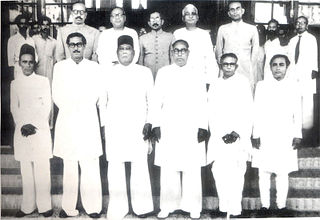
The Bangladesh Awami League, often simply called the Awami League or AL, is one of the major political parties in Bangladesh. The oldest existing political party in the country, Awami League successfully lead Bangladesh to the independence. One of the two most dominant parties in the country, along with its archrival Bangladesh Nationalist Party, it has been the ruling party since 2009, and has since been described as authoritarian.

The National Awami Party (NAP), translated from Urdu to English as National People's Party, was the major left-wing political party in East and West Pakistan. It was founded in 1957 in Dhaka, erstwhile East Pakistan, by Abdul Hamid Khan Bhashani and Yar Mohammad Khan, through the merger of various leftist and progressive political groups in Pakistan. Commonly known as the NAP, it was a major opposition party to Pakistani military regimes for much of the late 1950s and mid-1960s. In 1967 the party split into two factions.

Independence of Bangladesh was declared on 26 March 1971, celebrated as Independence Day, from Pakistan. The Independence Day of Bangladesh is celebrated on 26 March when Sheikh Mujibur Rahman declared the independence of Bangladesh. The Bangladesh Liberation War started on 26 March and lasted till 16 December 1971 which is celebrated as Victory Day in Bangladesh. There is a dispute along partisan line on who declared the Independence of Bangladesh. The Awami League claim Sheikh Mujibur Rahman while the Bangladesh Nationalist Party claim it was Ziaur Rahman.

Tajuddin Ahmad was a Bangladeshi politician. He led the Provisional Government of Bangladesh as its prime minister during the Bangladesh Liberation War in 1971 and is regarded as one of the most instrumental figures in the birth of Bangladesh.

Khan Abdul Wali Khan was a Pakistani democratic socialist politician who served as president of Awami National Party. Son of the prominent Pashtun nationalist leader Abdul Ghaffar Khan, Wali Khan was an activist and a writer against the British Raj like his father.

Khan Abdul Qayyum Khan Kashmiri was a major figure in British Indian and later Pakistan politics, in particular in the North-West Frontier Province, where served as the deputy speaker of the provincial assembly, first Chief Minister of North-West Frontier Province and served as Interior Minister of Pakistan in the central government from 1972 to 1977.
The Bangladesh Krishak Sramik Awami League was a political front comprising the Bangladesh Awami League, the Communist Party of Bangladesh, the National Awami Party (Muzaffar) and Bangladesh Jatiya League.

The United Front was a coalition of political parties in East Bengal which contested and won Pakistan's first provincial general election to the East Bengal Legislative Assembly. The coalition consisted of the Awami Muslim League, the Krishak Praja Party, the Ganatantri Dal and Nizam-e-Islam. The coalition was led by three major Bengali populist leaders- A. K. Fazlul Huq, Huseyn Shaheed Suhrawardy and Maulana Bhashani. The election resulted in a crushing defeat for the Muslim League. Veteran student leader of East Pakistan Khaleque Nawaz Khan defeated sitting Prime Minister of East Pakistan Mr. Nurul Amin in Nandail Constituency of Mymensingh district and created history in political arena. Nurul Amin's crushing defeat to a 27 years old young Turk of United Front effectively eliminated the Muslim League from political landscape of the then East Pakistan with United Front parties securing a landslide victory and gaining 223 seats in the 309-member assembly. The Awami League emerged as the majority party, with 143 seats.

General elections were held in Pakistan on 7 December 1970 to elect members of the National Assembly. They were the first direct general elections since the independence of Pakistan and ultimately the only ones held prior to the independence of Bangladesh. Voting took place in 300 general constituencies, of which 162 were in East Pakistan and 138 in West Pakistan. A further thirteen seats were reserved for women, who were to be elected by members of the National Assembly.
Mohammad Toaha was a language activist of the 1952 language movement and a prominent left-wing politician from Bangladesh.

Ataur Rahman Khan was a Bangladeshi lawyer, politician and writer, and served as Chief Minister of East Pakistan from 1 September 1956 – March 1958, and as the Prime Minister of Bangladesh from 30 March 1984 to 9 July 1986.
Hajee Mohammad Danesh was a Bangladeshi politician and communist activist born in the British India.

Abdul Hamid Khan Bhashani, often shortened as Maulana Bhashani, was a Bengali politician. His political tenure spanned the British colonial India, Pakistan and Bangladesh periods. Maulana Bhashani was popularly known by the honorary title Mozlum Jananeta for his lifelong stance advocating for the poor. He gained nationwide mass popularity among the peasants and helped to build the East Pakistan Peasant Association. Owing to his political leaning to the left, often dubbed Islamic Socialism. he was also called 'The Red Maulana'. He is considered as one of the main pillars of Bangladeshi independence of 1971.

Mahmud Ali was a progressive leftist Pakistani politician known for his agrarian politics. He was part of the Freedom Movement and played an important role during the Sylhet referendum which led to its merger with East Bengal. As member of Pakistan's Second Constituent Assembly he demanded the recognition of Bengali as one of the national languages of Pakistan and advocated the cause through his newspaper, the Nao Belal. He strongly opposed the 'One Unit' scheme and voted against the merger in 1956. After the dissolution of the assembly and abrogation of the 1956 Constitution he worked towards the restoration of provinces and a parliamentary form of government based on adult franchise.
Yar Mohammad Khan was one of the founders and the first treasurer of the Bangladesh Awami League, the main political party that eventually led Bangladesh's struggle for independence against the West Pakistan regime.

The Constituent Assembly of Bangladesh was the constituent assembly of Bangladesh. It was the country's provisional parliament between 1971 and 1973. In 1972, it drafted and adopted the Constitution of Bangladesh. The assembly was dominated by the Awami League, with a minority being independent lawmakers.
The non-cooperation movement of 1971 was a historical movement in then East Pakistan by the Awami League and the general public against the military government of Pakistan in March of that year. After the announcement of the suspension of the session of the National Assembly of Pakistan on 1 March, the spontaneous movement of the people started, but officially on the call of Sheikh Mujibur Rahman, the non-cooperation movement started on 2 March and continued until 25 March. The movement lasted for a total of 25 days.

Abdul Matin Chaudhury, also known by his daak naam Kola Mia ; and the epithet Jinnar Daain Haat ; was a Pakistani Bengali trade unionist, journalist, politician, and a member of the Pakistan Constituent Assembly as a representative of East Bengal.
Provincial elections were held in East Pakistan on 17 December 1970, ten days after general elections. A total of 1,850 candidates ran for the 300 seats in the East Pakistan Provincial Assembly. The result was a landslide victory for the Awami League, which won 288 of the 300 seats.

Provincial Assembly elections were held in East Pakistan in May 1962 as part of the wider provincial elections.














